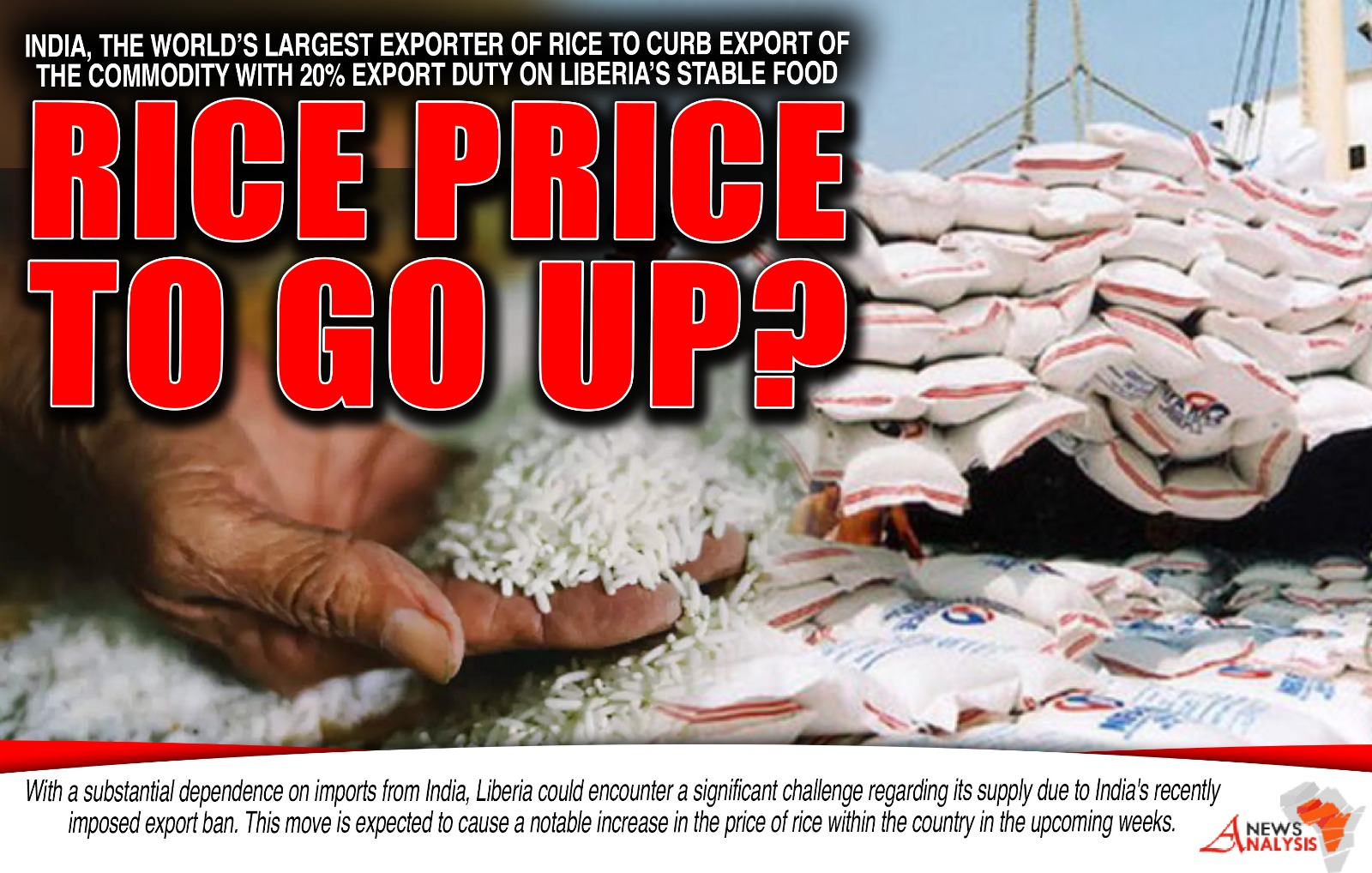Liberia, a nation heavily reliant on rice as its staple food, faces a critical juncture as India, the globe’s largest rice exporter, implements restrictive measures on the commodity’s export. With a substantial 20% export duty in place, the ramifications of this decision are poised to reverberate through Liberia’s food security landscape.
Rice consumption constitutes over 20% of Liberia’s total food intake, provides a major share of adult calorie intake, and commands approximately 15% of an average household’s expenditure, the intricate interplay of supply, demand, and pricing dynamics cannot be overstated.
Last month, India caught buyers off guard by implementing a ban on the export of commonly consumed non-basmati white rice, which came after a ban on broken rice exports the previous year.
India exported 7.4 million tons of parboiled rice in 2022.
In July, the United Nations Food Agency’s rice price index jumped to its highest level in nearly 12 years as prices in key exporting countries jumped on strong demand after India imposed restrictions on the exports.
With over 40% of global rice exports originating from India, the limited stockpiles among other exporting nations amplify the potential for reduced shipments, thereby contributing to the escalation of food prices. This situation has been exacerbated by the aftermath of Russia’s incursion into Ukraine.
In the latest economic update report on Liberia, Capehart Mulbah, Acting World Bank Country Manager for Liberia, said “Food insecurity remains a major challenge for Liberia, with more than four-fifths of the population facing moderate or severe food insecurity.” She added, “The strong preference for rice among Liberians makes it integral to the country’s food security, poverty alleviation, and efforts to address vulnerabilities.”
In January 2023, the national average price of imported rice (5% broken) stood at LRD 3010/25kg, reflecting a 9% increase when compared to the average price reported in June 2022. This price is 4% higher than that of local rice and 7% lower than the price of imported rice (100% broken), according to a 2023 Market Monitor Report.
The most recent official rice price hike occurred in December of the previous year when the Ministry of Commerce announced a $2.00 increase. This decision came in response to several instances of hoarding by importers and certain retailers. Prior to the government’s announcement, some retailers had already raised rice prices, particularly in the more remote counties. Wholesalers attributed the necessity for this price increase to the conflict in Ukraine and the rising cost of freight.
The Ministry of Commerce explained that the decision to increase the price of rice followed extensive consultations with all relevant stakeholders, including major rice importers and the Liberia Marketing Association coupled with recommendations from the Rice Stabilization Taskforce.
It explained that the decision was reached to adjust the price of rice to increase the importation volume, and increase the availability of the commodity on the local market.
Given the imposition of a 20% export duty, it is highly likely that importers in Liberia will feel compelled to contemplate yet another increase in rice prices during this critical period, as the country gears up for elections.
In its most recent report, issued in July of this year, the Food and Agriculture Organization (FAO) designated Liberia as one of the 33 African nations, out of the 45 worldwide, grappling with food security challenges. This predicament arises from the surge in food prices and the prevailing macroeconomic issues confronting the country and its populace.
The report highlights that during the lean season from June to August 2023, an estimated 531,000 individuals are expected to face acute food insecurity, with approximately 21,500 of them falling into CH Phase 4 (Emergency). The primary drivers of this acute food insecurity are the soaring international commodity prices and the escalated transportation costs, both contributing to elevated food prices.
Furthermore, the report indicates that as of May 2023, Liberia was providing shelter to approximately 1,800 refugees. The FAO attributes Liberia’s food insecurity predicament to the combination of high food prices and the economic downturn experienced within the nation.
Liberia stands out as the sole country among the 33 African nations mentioned in the report that is currently contending with food insecurity, despite the ongoing promotion of democracy, peace, and stability within its borders. Other African nations identified by the FAO as urgently requiring external food assistance encompass the Central African Republic (CAR), Kenya, Somalia, Burundi, Chad, Democratic Republic of Congo, Djibouti, Eritrea, Ethiopia, Malawi, Mauritania, Niger, Nigeria, South Sudan, and Zimbabwe.
Source: Front Page Africa






